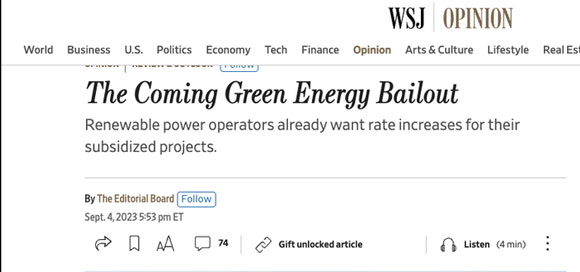For a long time I was a big supporter of renewable energy.
As a strong advocate for self-sovereignty, I like the idea of having control of my own energy supply.
Solar panels on my roof to tap into abundant and almost free sunlight? You beauty!
I also trusted the general narrative on climate change.
I took the ‘Pascal’s Wager’ view that, in the face of uncertainty, it was better to do something over nothing.
In Pascal’s case, the 17th century French philosopher reasoned it was better to choose to believe in God, than not.
Because if He did exist, then you’d pay an eternal price for non-belief if you were wrong!
Using this reasoning, if there’s any chance man-made climate change is real — no matter how probable or improbable you might think it — then we should act.
We owe it to our kids and grandkids.
However, my position on a lot of this has shifted…perhaps radically so.
Why?
Well, as famous economist John Maynard Keynes apparently once quipped ‘When the facts change, I change my mind. What do you do, sir?’
It’s fast becoming apparent to me that the renewable energy transition has some gaping holes in it.
What’s worse, no one seems to be too keen on addressing them, preferring to shout down or demonise any pushback.
This is a red flag in itself.
And unfortunately, it’s already leading to perverse real-world outcomes.
Many of these outcomes even fly in the face of the whole endeavour! Namely, reducing CO2 emissions.
The way I see it, we’re in danger of going down a Kafka-esque route that sacrifices a lot, for very little gain.
It could even be a net negative for the world.
What should we do then?
First of all, we need to leave our ideologies at the door and debate the implications of these important decisions properly before it’s too late.
Because one country is showing exactly what can go wrong if you don’t.
Let me explain….
Red flags from Germany
Germany has been the poster child for a renewable driven economy for a long time. They’ve very advanced plans to have an 80% renewables grid by 2030.
But this plan is now coming apart at the seams.
Because of it, they’ve gone from being the powerhouse economy of Europe to being dubbed the new ‘sick man’.
As CNBC reported last week:
‘The “sick man of Europe” moniker has resurfaced in recent weeks as manufacturing output continues to stutter in the region’s largest economy and the country grapples with high energy prices.
‘…Germany could lose 2% to 3% of its current industrial capacity as companies move operations to countries where gas and electricity are cheaper, such as the U.S. or Saudi Arabia, according to a research note released in August by Berenberg.’
This is the real economic consequence of moving to a more unpredictable and higher cost energy system.
As national broadcaster Deutsche Welle reported last week, the problems Germany are facing are complex:
‘Germany wants out of fossil fuels: no coal, no gas, no nuclear power plants. Instead, the country wants to commit fully to renewables.
‘But does this bring with it the threat of a major power blackout? Germany is gradually realizing where the sticking points are.
‘Take grid security: This is much easier to guarantee in a power network with just a few dozen large power stations than in a decentralized network with multiple small-scale electricity producers such as rooftops with solar panels or wind turbines.
‘“It’s now a matter of having to intervene several times almost every day to guarantee grid security,” says the spokesperson for one major network operator. If grid security can no longer be maintained, the threat of a nationwide blackout suddenly becomes very real.
‘Another problem is reliability. Because the sun doesn’t always shine and the wind doesn’t always blow, there might be too little power available on particular days and at particular times of the year. This also raises the possibility of unforeseen power failures.
‘One potential remedy could be power storage. There are many different ideas about how to securely store energy in order to bridge power gaps in the renewables’ supply: pumped-storage power plants, hydrogen storage, gigantic batteries.
‘But, if these technologies exist at all, they do so only on a very small scale: Current storage capacity in Germany is 40 gigawatt hours — enough to supply the country for up to 60 minutes. And if there’s still no wind and the sun still isn’t shining…?’
The sad truth is all of this was perfectly predictable.
So why did Germany commit to going down such a route without a proper plan?
Beats me…
But it gets worse.
No winners…except the grifters
As I said at the start, these decisions are actually hindering the supposed environmental benefits too!
Get this…
Germany has shut down their remaining carbon-free nuclear plants and are now ramping up coal-generated electricity in the face of their energy crisis instead.
A double whammy of incompetence.
(Editor’s Note: Our Editorial Director Greg Canavan uncovers the viability of nuclear as an alternative energy source in his interview with Rob Parker from Nuclear for Climate Australia. Scroll down to the end of this article to watch now.)
As the old saying goes ‘the road to hell is paved with good intentions’.
It’s never enough to be well meaning. You also need to have your facts right, especially in an industry as important as energy.
Beyond Germany, there are more clues things aren’t going to plan.
Here’s a headline from the Wall Street Journal last week:
|
|
| Source: WSJ |
Despite already being heavily subsidised, renewable power operators are already clamouring for more cash from the tax payer.
And yet we’re always told renewables are cheaper?
It doesn’t make any sense…
We’re getting an early taste of such future incompetence in Australia too.
I’m talking about the unbelievable blow out in costs of the government funded Snowy 2.0 hydro scheme.
This is a key plank of our own energy transition.
It was supposed to cost $2 billion but is now estimated to cost $13 billion and will be finished later than expected, in 2028 (hopefully!).
In short, I think we need to seriously think about all this, before we leap into the great unknown.
A final thought…
I came across a good rebuttal of Pascal’s famous wager recently.
It came from another French philosopher, the 20th century existentialist Albert Camus.
Camus — who didn’t believe in God — reasoned that in Pascal’s world, killing babies would be a sound and virtuous decision.
The reason being that babies wouldn’t have a chance to commit sin and thus would go straight to heaven.
The lesson?
Second order effects matter too.
And decisions rooted not in facts, but in ideology can have terrible consequences for real life.
Do we still need to make a transition to less carbon-intensive energy sources?
Perhaps.
I’m no expert on that.
But if we do decide we need to do that, we need to do it in full knowledge of the facts, no matter how uncomfortable they are.
And we need to do it without ideological agendas against things like nuclear or Bitcoin mining either.
Incidentally, Bitcoin mining — an industry that is demonised by the media and green groups alike — could be one of the most important actions we can take to combat harmful methane emissions in the short term. See here for more on that.
Simply put, we need to let the facts dictate our decisions, not the politics.
Fooling people into believing a Utopian energy transition is possible isn’t a solution.
And as Germany is showing us, it could lead to outcomes worse than the problems they’re supposedly trying to solve.
Good investing,
 |
Ryan Dinse,
Editor, Money Morning
PS: Our controversial research report, NOT ZERO, drops this week. Keep an eye on your inbox and be ready to stream the video. No doubt this one’s going to rattle a few cages…but we reveal a seriously compelling investment opportunity for those who can handle being called ‘heretics’.
In the meantime, we have something else for you to watch…
| Nuclear: The Only Sound Energy Future — Interview with Rob Parker |
Our Editorial Director Greg Canavan has been looking into the cost and implications of Australia’s energy transition to renewables from both an economic and political perspective.
In this video — a bonus episode of our podcast series What’s Not Priced In — Greg talks to Rob Parker, founder of Nuclear for Climate Australia. Rob uses the example of Ontario, Canada, as a model for Australia. The province has significant nuclear energy, no coal, and lower retail electricity costs than Australia.
It’s an enlightening conversation and one you certainly won’t hear in the mainstream media.
Check it out here.



